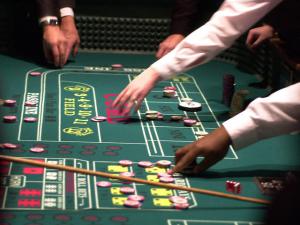Catholic Catechism Gambling
My Baptist friend says that gambling is a sin. Yet, I know many good Catholics who visit places like Atlantic City and play slot machines and the like, or schools that have casino nights as fund raisers. What should I say to my friend?
On the matter of gambling, the Catechism of the Catholic Church states: 'Games of chance (card games, etc.) or wagers are not in themselves contrary to justice. They become morally unacceptable when they deprive someone of what is necessary to provide for his needs and those of others. The passion for gambling risks becoming an enslavement. The Catechism does not offer any clear cut answer, so the Bishops stepped in to provide the insight and guidance the faithful need to be socially and morally responsible investors. It would seem prudent to apply the four requirements for gambling to investing.
The catechism of the Council of Trent by Catholic Church; Council of Trent (1545-1563); Pius V, Pope, 1504-1572; Donovan, J. Publication date 1829 Topics. Gambling and religion: Histories of concord and conflict. A ource of inspiration for this paper was an advertising campaign launched by the Church of weden in 2001, intended to promote interest in religious matters as the public elections for the local parish councils approached.
Gambling, whether it involves games of chance (e.g. card games), wagers or betting, or even lotteries, is not intrinsically evil (Catechism, No. 2404). However, a person may only engage in these activities with a strict adherence to virtue. First, he must act with temperance, whereby he keeps his passions and emotions under the control of reason, acts with moderation, and uses material goods in a good way and in accord with the circumstances of his life.
Second, the virtue of justice governs both the game itself as well as the person playing the game. The game must be fair and all players must have an equal chance of winning. In justice, the player's gambling must not prevent him from meeting his obligations to support himself or his family, pay his debts, or fulfill other responsibilities.
Consequently, a person must be careful not to become addicted to gambling, because of its excitement or the possibility of making 'quick, easy, big money.' He must not risk money that is necessary for the livelihood of himself or those entrusted to his care. Moreover, a gambler should always weigh whether that money could be better used for something of clear, tangible benefit. Even a wealthy person who may have great disposable income must use moderation, recognizing that the money risked on frivolous gambling could be used to help those less fortunate.
With this foundation in mind, several 'classic' rules govern gambling:
- A player must be free to dispose of the stakes wagered in the game. He must be able to accept the risk of losing the stakes without incurring harm to himself or to others. Basically, the stakes should be 'disposable' money.
- The player must make the gamble with full knowledge and consent.
- All players must have an equal chance of winning.
- The game must be fair. All fraud or deception is prohibited.
- While everyone enjoys winning, the motive for playing the game should be one of pleasure rather than of gain. One must not depend upon gambling for one's livelihood. (Prummer, Handbook of Moral Theology).
Even if one conscientiously follows these rules, he must always remain on guard. While gambling can be fun, it can also be very addictive. In a recent study, Harvard Medical School found that 1.29 percent of the adult population in America are pathological gamblers: this equates to 2.2 million addicted gamblers. Another 4 percent are considered 'problem gamblers.' Such addiction is a spiritual enslavement that a person allows to happen.
Besides addiction, a spiritual problem emerges when a person thinks he can make the quick, easy, big money gambling rather than by simply working hard. Here he accepts great risks that could have dire consequences. Such a condition deteriorates when a person loses money he should use for himself or his family and even accrues greater debt.
Be on guard, because gambling is a prevalent, luring, big business. Last year, the Council on Compulsive Gambling of New Jersey estimated that betting on last year's Denver-Atlanta Super Bowl reached $4 billion not including side bets and office pools. As of 1999, 37 states and the District of Columbia sponsored lotteries, and 26 states have legalized some form of casino gambling. According to the U.S. Department of Commerce, Americans spend $600 billion annually in legal gambling operations, at least $100 billion more than they spend for food. The revenues of the gambling industry continue to rise each year.
When I was studying at St. Charles Borromeo Seminary in Philadelphia, two fellow seminarians and I ventured to Atlantic City when we had a free weekend. Of course, we wanted to see this attraction, which was new at the time. I think we planned to spend $20 on the quarter slot machines, of course winning a little, losing a little, but in the end losing everything. Granted there was that temptation to keep going, thinking, 'The next one will be the jack pot,' but we held to the limit. I was appalled though by how many people spent hours loading the slot machines with multiple coins. Worse yet, I remember watching the action at a poker table and seeing the well-dressed, distinguished manager approach one of the players with a document to sign, which basically mortgaged his home. While I am sure most people had innocent fun, never really expecting to win, I wonder how many went away sad, regretting their actions. Herein we see the problem of gambling.
Catholic Catechism On Gambling
St. Augustine said, 'The Devil invented gambling.' Maybe so. Remember, as our Lord hung on the cross, the Roman soldiers threw dice to see who would get His tunic, seeking only their own benefit while being oblivious to the greater good (Jn 19:24). Granted, there is nothing wrong with gambling as long as it is kept within the confines of virtue. Nevertheless, one must be very careful and vigilant.
Acknowledgement

Saunders, Rev. William. 'Is Gambling a Sin?' Arlington Catholic Herald.
This article is reprinted with permission from Arlington Catholic Herald.

Catholic Catechism Gambling
The Author
Father William Saunders is pastor of Our Lady of Hope parish in Potomac Falls, Virginia. He is dean of the Notre Dame Graduate School of Christendom College. The above article is a 'Straight Answers' column he wrote for the Arlington Catholic Herald. Father Saunders is the author of Straight Answers, a book based on 100 of his columns, and Straight Answers II.
Copyright © 2003 Arlington Catholic Heraldback to top
Eric replied:
Emeka —
I'll leave it to my better-educated colleagues to address your second question. Eric |
Paul replied:
Emeka, You said: I'm sure the others here agree; I too am frustrated. There should be no disagreement on matters of faith and morals within the Church. Christ has given His Church the gift of infallibility in order to attain salvation, and, as you pointed out, to teach In His Name. Always follow the voice of Christ through the sacred Magisterium of His Church and you'll be fine. We gamble all the time, with our jobs, relationships, and every day choices. We take chances and (hope/pray) things work out well. The essence of gambling is not immoral. However, imprudence is.
Peace, Paul |
Emeka replied:
Paul,
Currently, I only have the internet to learn the Catholic Faith. Emeka |
Bob replied:

Emeka, You can get an app for a smart phone, or even your computer called 'Verbum'. This app has so many good resources; I love it. It has: |
Paul replied:
Emeka, Along with what Robert stated, if possible, it's always good to have a Bible and Catechism in book form. They represent the Word of God in Scripture and Tradition respectively and, of course, the Catechism contains Magisterial teaching. An easier version to read of the Catechism is called YouCat, created for youth. Further, the Catechism of the Catholic Church can be found online here: Pax, Paul |
Mike replied:
Emeka — This is what the Catechism states on gambling:
This echoes what my colleague Paul has said. You said:
Currently, I only have the internet to learn the Catholic Faith. By using these four (4) on-line resources:
|